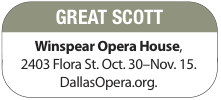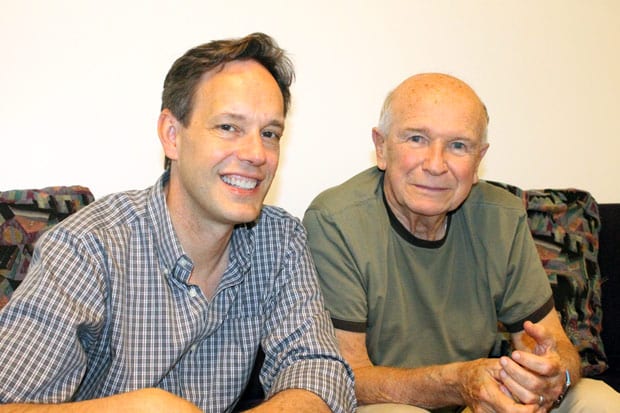The Dallas Opera’s world premiere season opener, ‘Great Scott,’ is a happy reunion for out collaborators Jake Heggie and Terrence McNally

ARNOLD WAYNE JONES | Executive Editor
jones@dallasvoice.com
Jake Heggie is probably the most acclaimed contemporary composer of opera, and Terrence McNally America’s reigning godfather of theater writing (four Tonys, thank you very much) — heady, intellectual men to be sure. But at the moment, they are talking about selfies … or more specifically, the tendency of people to view they entire world through the lens on their smartphones.
“It’s in our culture that your eye is automatically drawn to a flashing screen,” Heggie sighs. “The image seems more real to some people than the actual event.”
In a world full of flashing screens and Vine videos and click-bait hypertext links, does opera — or the arts in general — really matter anymore?
That’s the existential question posed by the latest collaboration between Heggie and McNally: Great Scott, a sort of meta-opera getting its world premiere this week at the Winspear Opera House. The story revolves around Arden Scott (mezzo Joyce DiDonato), a world-famous singer who returns to her home town to open a long-long opera and save the local company … except the opening falls the same night that the local football team is in the Super Bowl. Pro sports versus opera — which will win out?
Great Scott is set in “a major American city” that seems to mirror Dallas pretty closely — a welcome comparison, but mostly accidental.
“It’s not really a Texas story — that’s kind of a misconception,” says Texan McNally. “Texas is not the only state with professional football teams …”
“… or struggling opera companies,” adds Heggie. “It’s pretty much an American story. That’s what’s interesting about what Terrence came up with. I was in Denver one time, Seattle one time, San Diego, and each time [I explained the story], people would say, ‘Oh, it’s about us.’ Everyone can relate to it and take ownership.”
But despite being an opera about opera, Heggie and McNally believe Great Scott actually speaks to more universal concepts.
“We take on big human themes that people who aren’t involved in sport or the arts can understand — it’s about sacrifices,” Heggie says.
“Arden Scott could be a brilliant brain surgeon who hasn’t had a good personal life. There are so many humanistic themes [McNally] has woven through this piece. I find that very inspiring as a composer.”
McNally is slightly more circumspect.
 “If you write an opera about a theme, it’s going to be a lecture. Write a letter to a newspaper if you feel strongly about an issue — write a play about people,” he says. “That’s my philosophy — the themes emerge from themselves. [That said], there are themes that all audiences will recognize. I think it has something to say about the arts in America and what our commitment to the arts is and why should people struggle to put on opera when people seem perfectly happy texting.”
“If you write an opera about a theme, it’s going to be a lecture. Write a letter to a newspaper if you feel strongly about an issue — write a play about people,” he says. “That’s my philosophy — the themes emerge from themselves. [That said], there are themes that all audiences will recognize. I think it has something to say about the arts in America and what our commitment to the arts is and why should people struggle to put on opera when people seem perfectly happy texting.”
Such high-falutin concepts are not new for this duo. Although they have only formally collaborated once before on a full-length opera — Dead Man Walking, which dealt with the death penalty and redemption — their partnership extends for years. There’s an easy give-and-take between them, each giving credit to the other.
“Truly 50 percent of the success of an opera is the idea, and most of my ideas for my past operas have sprung from Terrence McNally,” Heggie gushes. “Dead Man Walking was his idea, The End of the Affair was his idea, Moby-Dick … Three Decembers was based on his script and I set the final monologue from his play Master Class to music… I owe him my entire career to Terrence.”
McNally demurs.
“Then you have to write all those notes!” he laughs. “I’m especially nervous this time since, it’s an original idea — most operas are based on something. But Jack O’Brien, our director, said the first day of rehearsal, ‘We are all discovering the piece together.’”
“Jack is such a genius director,” Heggie echoes. “He has discovered things in the libretto and score than neither Terrence nor I had thought of before. He’s literally the greatest director I’ve ever worked with, and I’ve worked with the best.” (O’Brien is also directing a new production of The Sound of Music, opening this week at Fair Park Music Hall; see sidebar for our interview about that.)
O’Brien, for his part, says Heggie and McNally deserve equal credit.
“They are engaging, charming, witty, literate guys,” says O’Brien, a three-time Tony Award winner. “They are very welcome voices to have in the opera world — they speak all the languages, and I don’t mean romance language. I mean they are political men, sympathetic men, contemporary men and with the amazing pedigree of knowledge who know that pain that goes into making an opera.” And like the authors, O’Brien sees the universality of the tale.
“The thing about watching this emerge is, you study the libretto and you listen to the [piano score] and it goes from two dimensions to three. Then you add a cadre of the best singing actors alive, who happen to be opera singers, and you realize, ‘Holy moly! This is all about us — not just the performing arts but about risk and opportunity and the road not taken. It’s an astute, edgy, very witty scenario that becomes this ravishing ersatz bel canto work. I don’t know I have ever seen a piece like this.”
It an estimation Dallas audiences will have the first chance ever to evaluate for themselves.
This article appeared in the Dallas Voice print edition October 30, 2015.











